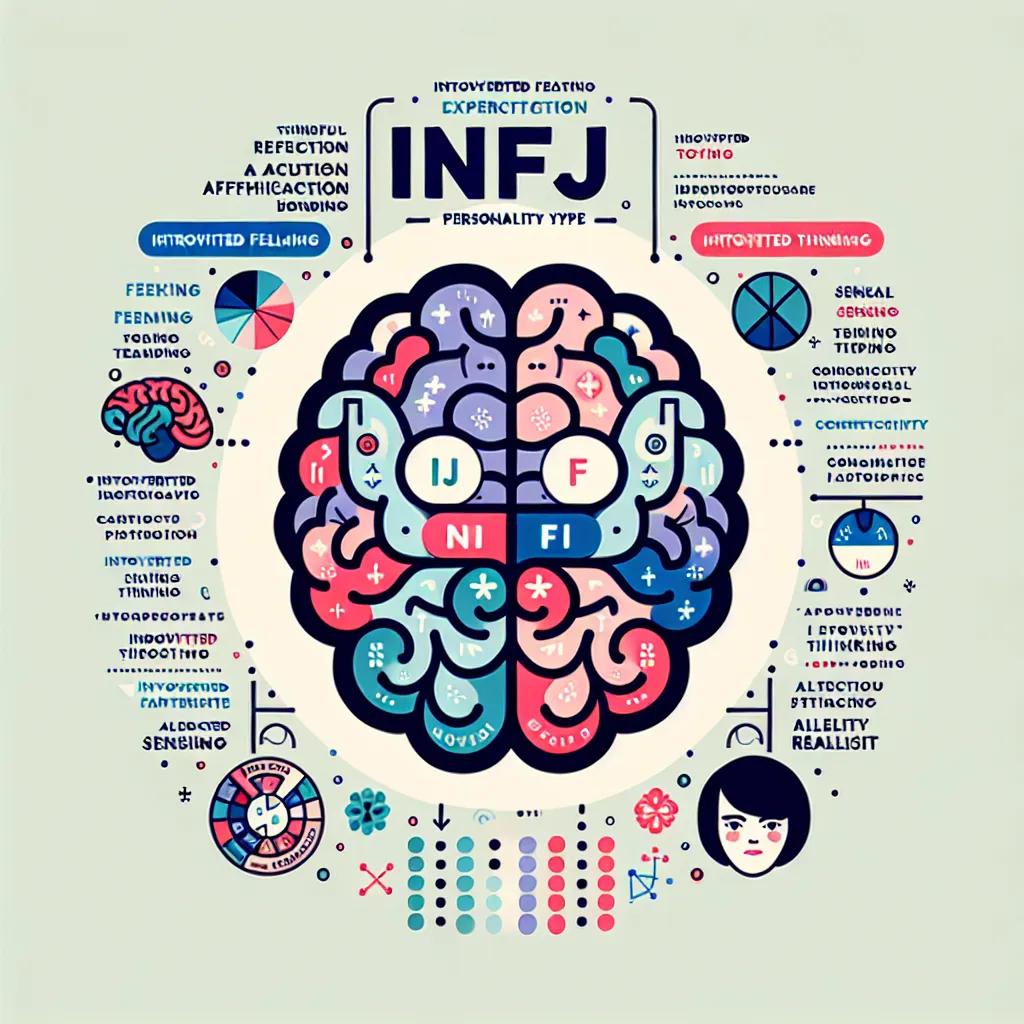The INFJ personality type, one of the sixteen Myers-Briggs Type Indicator (MBTI) personality types, is a complex and rare category that embodies a unique set of traits and characteristics. INFJ stands for Introverted, Intuitive, Feeling, and Judging. As one of the most intriguing personality types, INFJs are often referred to as advocates or idealists. Throughout this article, we will delve deep into the world of INFJs to understand what makes them tick, their strengths and weaknesses, and how they navigate the world around them.
At their core, INFJs are introverted individuals who prioritize their internal thoughts and feelings. They are not typically the center of attention in social situations and often prefer a small circle of close friends rather than a wide network of acquaintances. This preference for depth over breadth in relationships stems from their dominant function, introverted intuition (Ni), which works continuously to synthesize information and form insights about themselves and others.
INFJs have a distinctive approach to life, characterized by their intuitive nature. This trait allows them to see beyond the surface and understand deeper meanings and connections that others might miss. This profound insight contributes to their vision of a better future and often results in INFJs being passionate about causes that they believe in. Their intuition is also their guide when making decisions, allowing them to navigate complex situations with a sense of certainty and foresight.
The ‘F’ in INFJ stands for feeling, but it’s essential to understand that this is not just about being emotional. What sets INFJs apart is their decision-making process, which is based on their values and understanding of others. They genuinely care about people’s well-being and are often empathetic and compassionate. This sensitivity to the feelings of others, combined with their intuitive abilities, makes them excellent at reading people and situations.
As judgers, INFJs are organized and decisive, valuing structure and order in their lives. They like to plan ahead and have a clear sense of direction. This aspect of their personality helps balance the abstract nature of their intuition, allowing them to turn their insightful ideas into actionable plans. They have a preference for closure and resolution, which drives them to follow through on their commitments with a dedication that is admirable.
The combination of these traits provides INFJs with unique strengths. They are creative problem solvers who can think abstractly and see the big picture. Often described as wise beyond their years, INFJs are forward-thinking and can envision long-term possibilities. Their empathetic nature, paired with their intuitive insights, makes them exceptional at counseling and guiding others. People often turn to INFJs for advice and comfort because they feel understood and valued.
Despite the many strengths of INFJs, they also face challenges and weaknesses that are inherent to their personality type. For instance, being an advocate can come with great emotional intensity. INFJs can be prone to taking on the emotions of others, making it essential for them to find ways to protect their emotional well-being. They can sometimes become overwhelmed by the problems of the world, which they feel an innate desire to solve.
Another challenge for INFJs is their tendency towards perfectionism. Their inner world is often structured and idealistic, and when reality falls short of their high standards, it can lead to frustration and disappointment. It’s crucial for INFJs to remember that imperfection is part of the human experience and to practice self-compassion.
In relationships, INFJs are often warm and caring partners who strive to understand and support their significant others. However, their need for a deep connection can sometimes lead to them overlooking potential red flags or staying in relationships that aren’t healthy in the hope of achieving the ideal they have in mind. It’s vital for INFJs to maintain their standards but also balance them with practicality in their interpersonal relationships.
In terms of careers, INFJs often thrive in roles that align with their values and allow them to make a meaningful impact. They are well-suited for careers in counseling, psychology, writing, education, healthcare, and the arts. Whatever field they choose to pursue, it’s essential that they feel connected to their work and believe it serves a greater purpose.
INFJs and personal growth go hand in hand, as they are natural self-improvers. They are always seeking to better understand themselves and the world around them. For personal development, INFJs should focus on setting realistic goals, practicing self-care, and allowing themselves to embrace imperfection. Engaging in creative activities like writing, music, or art can also be therapeutic outlets for their rich inner lives.
In social situations, INFJs may struggle due to their introversion and sensitivity. Despite their reserved nature, they often desire authentic connections with people. Networking and engaging in communities that share their interests can be effective ways for INFJs to overcome these challenges and form meaningful relationships.
To facilitate growth and understanding of INFJs, it helps to have comprehensive insights into their personality. Learning about cognitive functions can provide a more in-depth view of their inner workings. INFJs lead with introverted intuition (Ni), which gives them their characteristic insightfulness. Their auxiliary function, extraverted feeling (Fe), allows them to connect with and respond to the emotions of others. Their tertiary function, introverted thinking (Ti), helps them analyze information critically, while their inferior function, extraverted sensing (Se), can be a valuable tool in becoming more present and engaged with the world around them.
In conclusion, the INFJ personality type is complex, compassionate, and driven by a desire to make a positive impact in the world. While they face unique challenges due to their intrinsic nature, their strengths far outweigh their vulnerabilities. By embracing their innate gifts and navigating their weaknesses with awareness and grace, INFJs continue to inspire and bring change to the lives they touch. Understanding the depth of the INFJ personality type can unlock potential, foster personal growth, and contribute to the creation of a more empathetic and intuitive society.



Leave a Comment